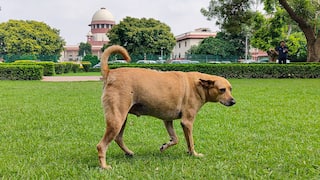Indian Covid Variant B.1.617 Detected In Atleast 19 Countries; Know Why This Variant Spreads So Fast
The Indian variant B.1.617 has been found in at least 17 countries as per WHO, but that number has likely increased considering Morocco & Indonesia too reported two cases each of the same strain.

New Delhi: Last week, India crossed the 4 lakh mark in daily and now there has been a slight dip. On Tuesday, India reported lodged 3,57,229 new Covid-19 cases in past 24 hours.
Experts have attributed this sudden spike of cases to the variant, named B.1.617 which is dubbed as the "double mutant" variant. Virologist Shahid Jameel said that the B.1.617 variant contains two key mutations - E484Q and L452R - to the outer "spike" portion of the virus that attaches to human cells. The Indian variant has been found in at least 17 countries around the world.
ALSO READ: Steroid Use In Mild Symptoms Of COVID-19 Leads To Drop In Oxygen Level: AIIMS Chief Randeep Guleria
Indian variant found in at least 17 countries
Late last month, World Health Organization said the B.1.617 variant of Covid-19 been detected in over 1,200 sequences uploaded to the GISAID open-access database “from at least 17 countries"
On Monday, Morocco detected its first two cases of the Indian variant of the coronavirus after which their contacts have been quarantined. Indonesia too recorded two cases of a highly infectious variant the Health Minister Budi Gunadi Sadikin said on the same day. The fast spread of this variant from Britain and Iran to Switzerland has sparked global concern and spurring several to close their borders to people travelling from India.
Mutation in Viruses
Canadian researchers published the first structural images of a mutation in the B.1.1.7 variant of the Covid-19 virus that may explain why it has proved far more infectious than the previous strain, causing a rapid rise in cases not just in the UK, but possibly also in India and Canada. The B.1.1.7 variant, first reported by the World Health Organization (WHO) in mid-December last year, has an unusually large number of mutations.
Dr Sriram Subramaniam of University of British Columbia's (UBC) faculty of medicine’s department of biochemistry and molecular biology led the research team and told HT 'they project to have similar structural images of the B.1.617 variant - that originated in India - by the end of May'.
Explaining why viruses mutate, Dr. Shahid Jameel told IANS, "Mutation is natural to a virus. Every time a virus multiplies, random copying errors take place. Most of these errors are deleterious to the virus and those mutants don't survive. However, sometimes a mutation gives an advantage to the virus by binding and entering cells just a little better than its predecessor or by side stepping pre-existing immunity. These mutant viruses are selected and overtake the original virus. But there is a limit to how much a virus can mutate. Beyond a point, mutations will compromise essential steps in the virus multiplication and infection process."
Common Symptoms of the new variant
While the common symptoms of Covid-19 is known by all are dry cough, fever, loss of taste, and smell. There are instances where the RT-PCR tests aren't able to detect the new variant even whent the person is showing Covid symptoms which makes it difficult to treat on time. Doctors advice that if a person is showing Covid symptoms they must self isolate with immediate effect and then reach out to a doctor get requiste tests. It is also advised to mointor your Oxygen levels.
Dr Shuchin Bajaj, Founder and Director, Ujala Cygnus Group of Hospitals told HT Mint "...newer symptoms found in patients are fever, pain in muscles, dry and persistent cough, and loss of smell and taste. In addition to conjunctivitis, sore throat, headache, rashes, upset stomach, and discolouration of fingers and toes."
"In addition to the typical COVID symptoms such as fever, pain in muscles, dry and persistent cough, and loss of smell and taste, many this time are reporting additional symptoms like conjunctivitis, headache, diarrhea, and discolored fingers and toes," Dr Piyush Goel, Senior Consultant- Pulmonary and Critical Care, Columbia Asia Hospital, Palam Vihar, Gurugram told Mint last month.
Covid vaccines are effective
Since the virus is spreading like a wildfire, vaccination has become even more essential. Dr. Shahid Jameel told IANS, waves depend on vaccine availability, coverage and duration of protection. It will also depend upon whether the virus can change further and continue to productively infect those who have already been infected or vaccinated.
Last week, Dr. Anthony Fauci who is the chief medical adviser to the White House said that Bharat Biotech's Covaxin has been found to neutralise the 617 variant of the deadly virus during a press conference in Washington. Dr. Fauci said "This is something where we're still gaining data on a daily basis. But the most recent data, was looking at convalescent Sera of COVID-19 cases and people who received the vaccine used in India, the Covaxin. It was found to neutralise the 617 variants," during the press conference according to PTI.
The total vaccination across the country has crossed more than 15.88 Cr mark. The country has administered nearly 16.5 lakh vaccine doses till 8 pm on Monday. The cumulative number of COVID-19 vaccine doses administered in the country stands at 15,88,71,435
Check out below Health Tools-
Calculate Your Body Mass Index ( BMI )
Calculate The Age Through Age Calculator
Related Video
Breaking News: India’s GDP Expected to Grow at 7.4% This Fiscal Year, PM Modi Calls It Positive News





































